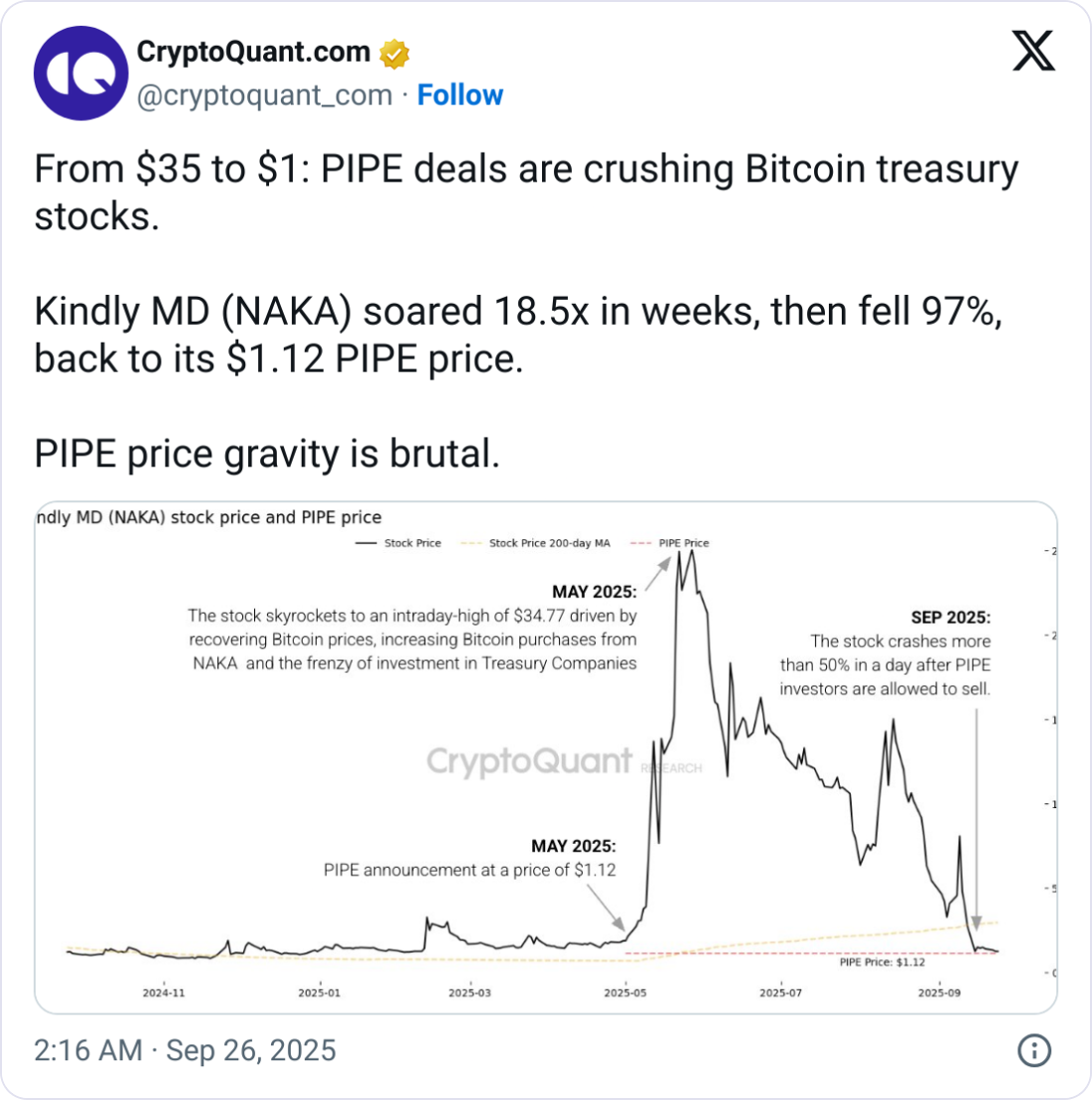Crypto Treasuries Face 50% Downside Risk from PIPE Selling Pressure
Crypto portfolios are staring down the barrel of massive valuation hits as private investment public equity (PIPE) selling pressure threatens to slash prices by half.
The PIPE Problem
When institutional investors dump their positions through PIPE agreements, they create overwhelming selling pressure that can crater even the most promising crypto assets. These aren't retail traders panicking—these are calculated exits by players who got in early and cheap.
Market Mechanics Exposed
The very structure that brought institutional money into crypto now threatens to undermine it. PIPE investors typically hold lock-up periods, but when those expire, the floodgates open. We're talking about concentrated selling that can overwhelm daily trading volumes and trigger cascading liquidations.
Survival Strategies
Smart treasury managers are already repositioning—diversifying holdings, setting stop-losses, and building cash reserves for the inevitable buying opportunities. The ones who treat this as business as usual might learn the hard way that traditional finance rules still apply, even in decentralized markets.
Just when you thought crypto had escaped Wall Street's playbook, the old guard reminds everyone who wrote the rules on extracting value. The question isn't whether there will be blood in the water—it's whose portfolios will still be floating when the feeding frenzy ends.
PIPE-flushed firms face downside risk
CryptoQuant noted that PIPE deals allow companies to quickly and flexibly access cash, but said such deals “can create negative effects for a company’s stock performance” as investors aim to lock in profits.
“The PIPE increases the amount of shares in circulation, diluting existing shareholders,” it said. “When PIPE investors are able to sell, the resale of these new shares creates an ‘overhang’ that pressures the stock price.”
CryptoQuant analyzed the stocks of some Bitcoin (BTC $109,573) treasury companies that conducted PIPE deals, finding that many “have experienced significant stock drawdowns, with share prices often gravitating toward their PIPE issuance levels.”
It pinned “actual or anticipated selling from PIPE investors” as the reason for the drawdowns, noting shares in the medical firm turned BTC treasury Kindly MD (NAKA) fell by over half in a single day once its PIPE shares unlocked.

Chart showing Kindly MD’s share price overlaid with key events related to its PIPE deal. Source: CryptoQuant
CryptoQuant said Kindly MD shares ROSE from around $1.80 in late April to an intraday high of nearly $35 in late May on its PIPE announcement. However, it’s since dropped by 97% to a low of $1.16, “basically touching its $1.12 PIPE price.”
Other crypto treasuries could head down
CryptoQuant noted that other PIPE-backed crypto treasury companies “seem to be going in the same direction,” seeing their share prices fall after PIPE deals.
Shares in Strive Inc. (ASST) closed trading on Thursday at $2.75, down 78% from its 2025 peak of $13 in late May.
CryptoQuant said Strive’s PIPE was priced at $1.35, “which WOULD imply a 55% price drop from current levels” as its PIPE investors “will be allowed to sell their shares next month, putting further downward pressure to the stock.”
It added that Cantor Equity Partners (CEP), a blank-check company merging with the treasury firm Twenty One Capital, priced its PIPE at $10. It’s also fallen nearly 70% from its high to under $20, “implying a potential 50% price drop from its current level.”
Other analysts have warned that even the well-established crypto treasury companies are facing pressure as the value of their crypto holdings creeps toward the company’s value, which could spark a wave of selling.
CryptoQuant said that a “sustained rally in bitcoin is the only likely catalyst that could prevent further declines in these stocks. Without it, many are poised to continue trending toward — or below — their PIPE prices.”

